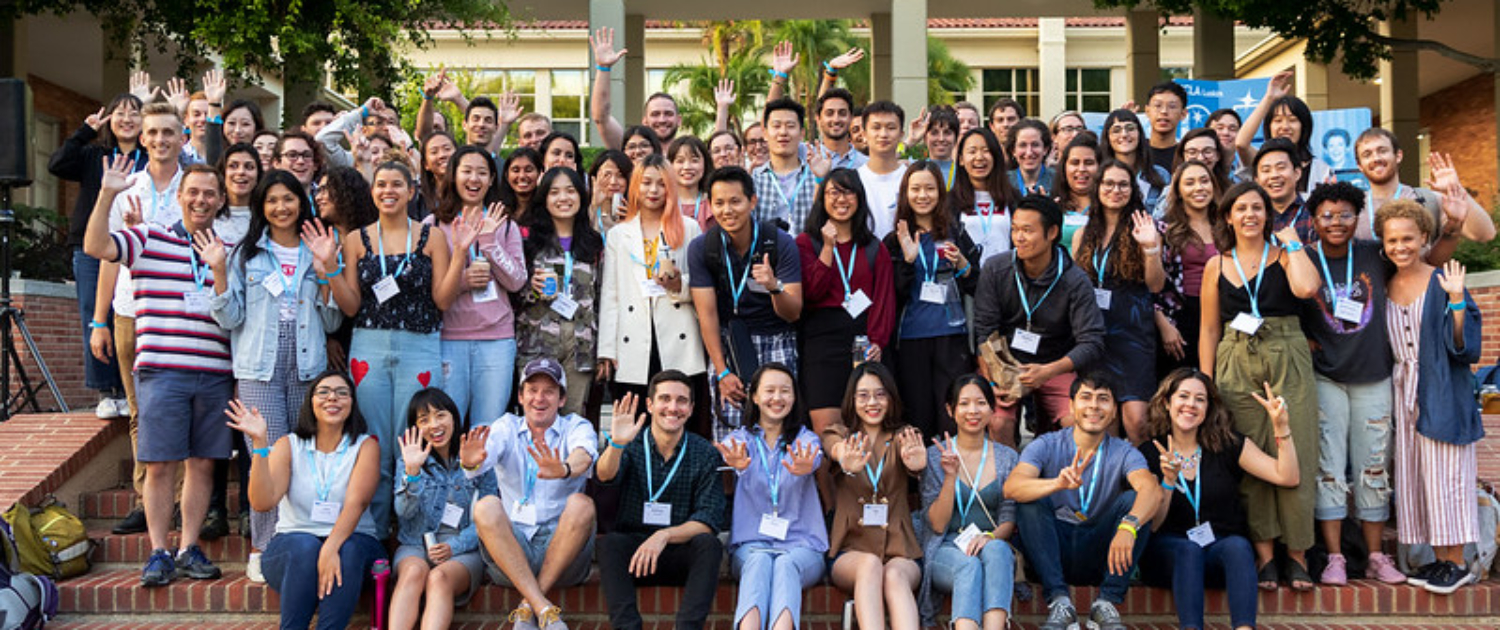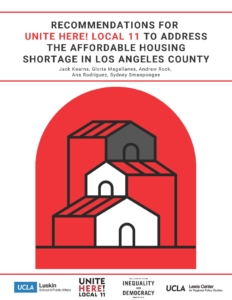Our Master of Public Policy graduate students are required to engage in real-world policy analysis as part of their education. The result is a body of research representing fresh thinking about longstanding topics in public policy and a more well-rounded graduate education.
Student Research
The MPP Program culminates in a mandatory three-quarter sequence of courses, led by faculty advisers, dedicated to the preparation and presentation of a major Applied Policy Project (APP) on behalf of a client agency, nonprofit organization, or firm working in the public interest. The objective is to challenge students to conduct a detailed investigation of a real policy problem facing the client and to develop evidence-based and actionable recommended solutions. Students are encouraged to grapple with the challenges of policy implementation in the midst of competing and often conflicting social, political, economic, and technical interests.
The department annually recognizes Distinguished Applied Policy Projects with the award of Highest Honors or Honors. Projects cover the variety of policy topics, including:
- Education
- Health
- Environment
- Energy
- Transportation
- International issues
- Sustainability
- Social Policy
- Employment and labor
- Urban poverty
- Human rights
- Science and technology
- Regional development
- Aging
- Crime and drug abuse
- Arts and culture
2024 APP Honorees
Honors
Title: Addressing the Discriminatory Impacts of Redlining & Highway Development in California
Authors: Jantzen Hale, Isaac Bushnell, Elizabeth Flores, Itzel Vasquez-Rodriguez, Makenna Cavanaugh
Client: Department and the Office of Environmental Health Hazards
Assessment
Faculty Advisor: Prof. Michael A. Stoll
Honors
Title: Recommendations for UNITE HERE! Local 11 to Address the Affordable Housing Shortage in Los Angeles County
Authors: Jack Kearns, Gloria Magallanes, Andrew Rock, Ana Rodriguez, Sydney Smanpongse
Client: UNITE HERE Local 11
Faculty Advisor: Prof. Michael A. Stoll
Honors
Title: From Insight to Impact: Integrating Staff Voice into Professional Development within LAUSD’s Board District 7
Authors: Jessica Baron, Yolanda Cerezo, Evangeline Chapman, Selena McLurkin, Sam Newman
Client: Office of Board Member Tanya Ortiz Franklin
Faculty Advisor: Prof. Emily Weisburst
Honors
Title: Empowering Autonomy: A Community-Based Approach to Sex Work Policy
Authors: Rizza Estacio, Leer Fu, Jada Jones, Sarah Nunnink, & Vananh Tran
Client: Department and of Sex Workers’ Outreach Project Los Angeles (SWOPLA)
Faculty Advisor: Michael Masserman
For Prospective Clients
Client organizations needed! Does your organization have a policy question it needs to address? This brochure provides information for organizations that would like to have a team of UCLA MPP students consult on these issues.
Student Organizations
Consistent with the University policy on nondiscrimination in all University-sponsored programs, all students may participate in any of the described clubs and organizations.
Public Policy Leadership Association
The Public Policy Leadership Association (PPLA) is a student organization representing and advocating for the interests of public policy students. The PPLA advances the mission to foster an accommodating, inclusive, and equitable learning environment for all UCLA MPP students. To further promote the interest of the students, the PPLA incorporates Public Policy administration and student leaders from different Luskin Caucus organizations. Every UCLA MPP student is a member of PPLA and is invited to attend and participate in PPLA events.
2025-26 PPLA Leadership:
Resources
All-in-One Google Site
Campus Resources
Please click here for a list of campus resources.
UCLA Academic Calendar
UCLA Library Public Policy Resource Guide
Our Courses
Department of Public Policy Schedule of Classes
Recommended Course Offerings
Please click here for a list of recommended courses that our students have found valuable.
Sample Syllabi
Please note that the materials covered in the sample syllabi are subject to change at any moment’s notice.
Core Courses
PUB PLC 201 – Principles of Microeconomic Theory I
PUB PLC 202 – American Political Institutions and Processes
PUB PLC 203 – Statistical Methods of Policy Analysis I
PUB PLC 204 – Principles of Microeconomic Theory II
PUB PLC 206 – Political Economy of Policy Adoption and Implementation
PUB PLC 208 – Statistical Methods of Policy Analysis II
PUB PLC 209 – Management in the 21st Century
PUB PLC 210 – Methods of Policy Analysis
Electives
PUB PLC M217 – Graduate Seminar in Environmental Economics and Policy
Student Initiated Courses
Any group of seven or more students may petition any faculty member to organize a new course to be offered during a subsequent term. The petition must be countersigned by:
- the faculty member willing to offer and/or supervise the course and
- the students who will take the course if offered.
The petition should be submitted to the Department’s manager. Following faculty review, final approval of the course resides with the Department Chair. Such approval will take into account the demand for courses that the faculty member would otherwise teach.
Student initiated courses can be student-led under faculty supervision (and numbered PUB PLC 297D), or may lead to special topics courses taught by faculty or visitors, resources permitting. Students may complete a maximum of two and apply up to eight units of the student-initiated (PUB PLC 297D) courses for credit during their degree program. All PUB PLC 297D courses are graded S/U, while special topics courses may be taken for a letter grade or S/U.
Faculty agreeing to supervise a student-initiated course are responsible for determining that the readings, topics, and assignments are appropriate in scope and scale to a graduate course in Public Policy. Faculty are expected to attend each of the class meetings, except by special arrangement (as with other courses that they teach), and are responsible for overseeing and approving the grading of assignments and the assignment of final grades.
Funding Your Studies
A number of resources are available to UCLA Luskin students to fund their studies, including fellowships that can provide multiple years of funding to students who know to apply for them. The basis for eligibility can vary: they can be broad in availability and awarded based on academic merit, or selective and available only to students meeting precise conditions. Many may only be available to students in their first or second year. It is imperative that students inform themselves and begin the application process early.
Funding Resources
The following resources are available for all students as they begin their search:
UCLA Graduate Education Database
UCLA Graduate Education – Fellowships, Scholarships & Grants for Entering Students
PDST Fees (In Progress)
“Funding Your Studies” Reference Guide
Orientation Presentation – “Graduate Student Resources & Funding Your Studies”
More documents will be uploaded shortly.
Public Policy Fellowships
The Department of Public Policy itself awards several fellowships based on merit and policy focus. Like many others fellowships, some have specific qualifications, while others are awarded based on overall academic performance, professional experience, and future potential in public policy.
The following fellowships are designated for the Public Policy Department to honor distinguished applicants who have demonstrated outstanding merit in their preparation for engaging in graduate studies in public policy. These fellowships will be awarded based on the applicant rankings by the Admissions Committee.
Bette and Lorenz Han Endowed Fellowship
A fellowship awarded by the Public Policy Department to recognize the excellence of outstanding applicants and students.
Calvin and Marilyn Gross Fellowship
Calvin and Marilyn Gross are long term supporters of the School of Public Affairs, having given the founding gifts to the Dukakis Internship endowment. They have established an endowment that will enable the Department of Public Policy to annually fund an outstanding graduate student demonstrating commitment and involvement to public service.
David and Marianna Fisher Fellowship
This fellowship was created to strengthen UCLA Luskin’s efforts to compete for, recruit and retain outstanding graduate students to its excellent academic and professional degree programs.
Hal E. Martin Fellowship in Health and Social Policy
This fellowship recognizes outstanding students pursuing policy analysis and graduate education in various aspects of health and social policy. Applicants need to provide a brief statement (half-page double-spaced, 100 words) indicating their interest and/or background in health and social policy. This fellowship has additional eligibility qualifications and requires a supplemental statement.
ITS Fellowship
The Public Policy Department offers a concentration in transportation policy and planning. Transportation policy students can choose from among five graduate transportation policy and planning courses and three other transportation-related courses in designing their program of study. The School houses a branch of the University of California Institute of Transportation Studies, which offers renewable one-year graduate fellowships, research assistantships where students work with faculty on transportation policy research, and financial aid to students attending transportation conferences. Fellowship recipients must be U.S. citizens or permanent residents, must take or waive out of at least four approved transportation policy and planning courses during their studies, and must complete their Applied Policy Project on a transportation-related topic. To apply for this fellowship please include a brief statement (half-page double-spaced, 100 words) describing your interest in the transportation policy and planning concentration or any background that you may have in this area. This fellowship has additional eligibility qualifications and requires a supplemental statement.
Ronald Reagan Public Policy Fellowship
The Ronald Reagan Public Policy Fellowship, underwritten by The Draine Family Charitable Foundation Inc., supports UCLA Luskin graduate students in studying Ronald Reagan and the effects of his economic, social, and international policies on the State of California, the Federal Government, and the world. The Fellowship allows its recipients, as interns, to gain access to the archives at the Ronald Reagan Presidential Library, and with agreement by the Foundation’s Executive Director, to publish their findings as a resource to scholars, teachers, and students on the Foundation website. For more information, visit the Ronald Reagan Library website.
Teaching and Research Assistantships
“Academic Apprentice Personnel” is the term applied to registered graduate students who have fulfilled the University’s established criteria for appointment (no more than 50% time) to teaching or research assistantships, and for which they are compensated at rates approved annually by the Regents of the University of California. These apprenticeships are intended to provide qualified students with relevant training experience for academic and academic-related careers in teaching and research and to augment limited resources from within the University for graduate student support. As a matter of University policy, apprentice personnel in both the teaching and research series are considered primarily as students being professionally trained. Graduate students who are recipients of teaching and research assistantships must meet all registration and enrollment criteria established by the Graduate Division and the department. They must also maintain satisfactory progress throughout their appointments. Teaching assistants are selected on the basis of scholarship and promise as teachers and serve an apprenticeship under the tutelage and supervision of regular faculty members who are responsible for curriculum and instruction in the University. Research assistants are appointed to the title graduate student researcher (GSR), and are selected on the basis of scholastic achievement and promise as creative scholars and serve an apprenticeship under the direction and supervision of a faculty member.
Academic Apprentice Personnel Manual
Academic Apprentice Salary Scales
Current salary scale tables for teaching & research series, readers & special readers, and remedial tutors.
Fee Remission Benefits & Statement of Understanding
Summary of benefits, requirements for maintaining benefits, and acknowledgment statement.





